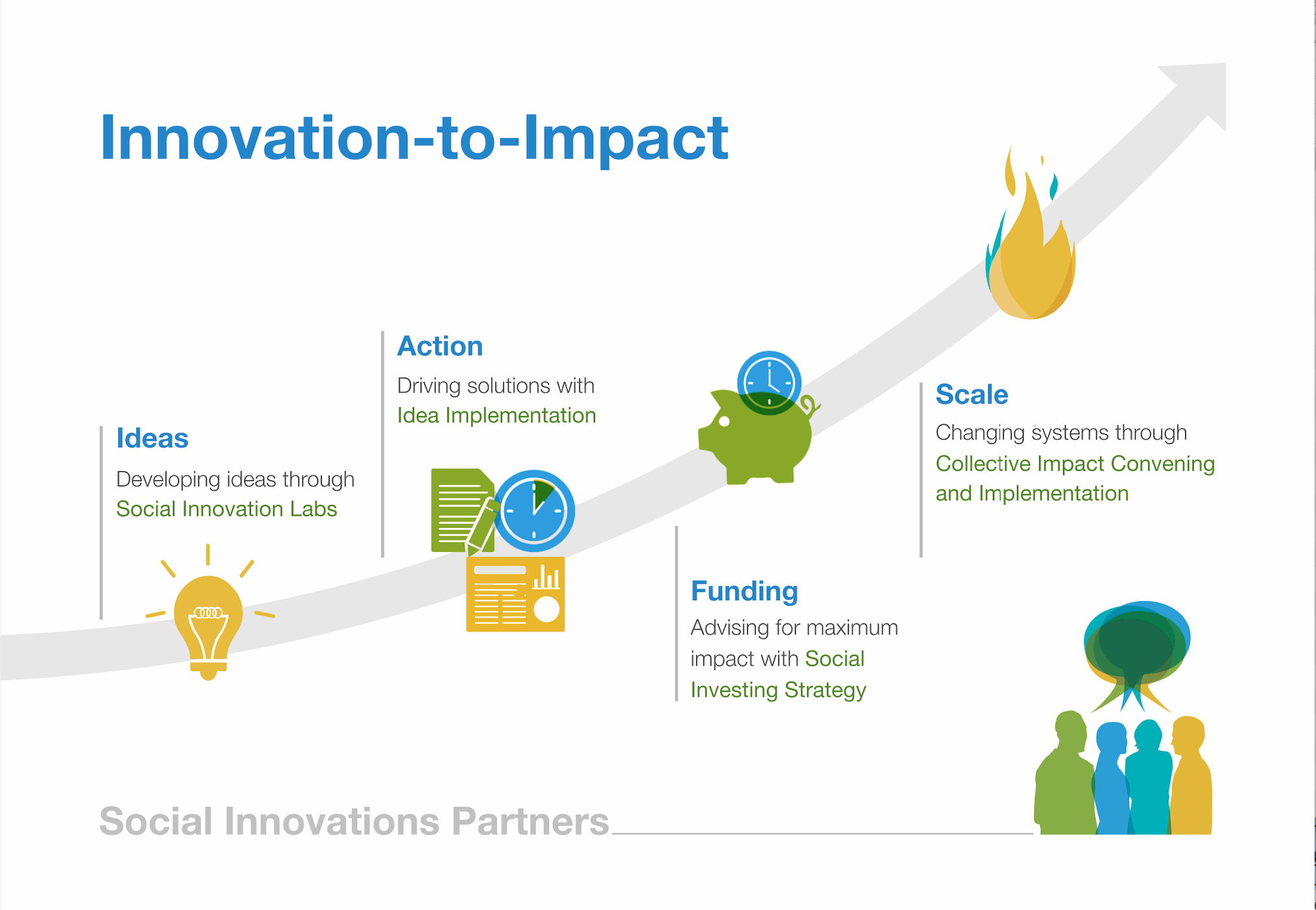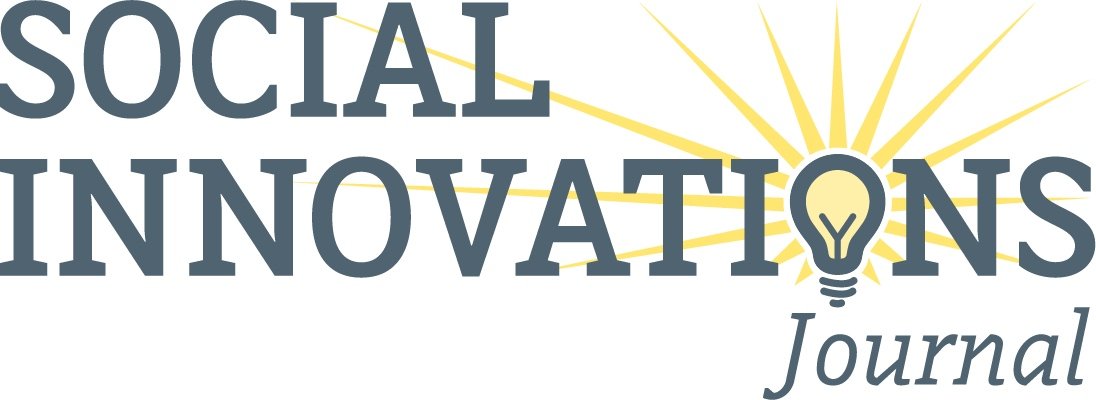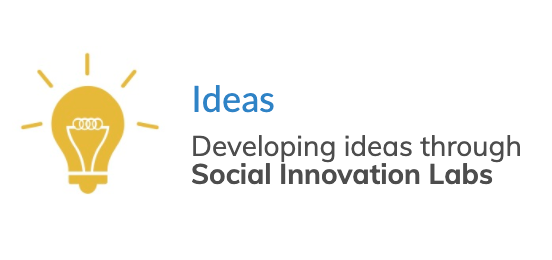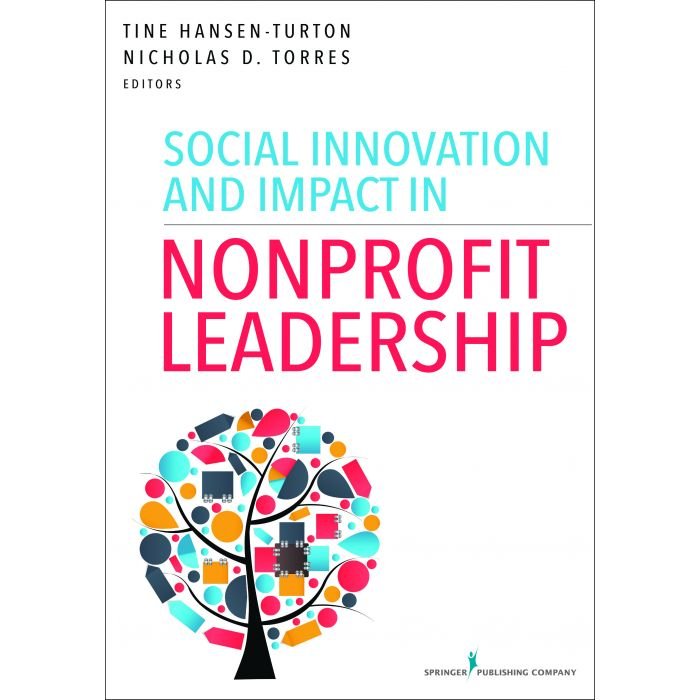We work with your team to transform your ideas into viable solutions to your biggest problems. Our process is comprehensive and will help your organization embrace innovation as a way to make change happen.
We help launch and execute your ideas until they are self-sustainable.
We share our clients' aspirations. We think and act like partners.
Our History: Our purpose is to teach and inspire leaders to better understand and undertake the process of innovative thinking and social entrepreneurship. In 2008, we started the The Social Innovations Journal ™, in a journey to change the world. We had a simple mission: to create a space for social sector leaders to share their ideas, and, in the process, to inspire others to dream and innovate. Over time the journal expanded to include the Social Innovations Institute and Lab™ whose mission is to teach and inspire civic, government, social, and private sector leaders to better understand and undertake the process of innovative thinking and social entrepreneurship to achieve social impact.
LEADERSHIP
Social Impact
SOCIAL INNOVATIONS & ENTERPRISE
Nicholas Torres, M.Ed, has over 25 years of experience in executive management, Nicholas works at the cross section between the private sector, government, and not-for-profits to align them toward collective social impact and change public policy. Nicholas is CEO and Co-Founder of Social Innovations Partners which publishes the Social Innovations Journal and provides consulting services to Government and Social Impact Investors. Nicholas has led and founded multiple for-profit and not-for-profit social ventures that are driven both by social impact and financial sustainability measures. Some of his launched social ventures include charter schools, an early literacy technology platform; school-based health centers; and community-based satellite college sites. He teaches Nonprofit Leadership, Social Policy, and Social Entrepreneurship at University of Pennsylvania.
nick@socialinnovationspartners.org
Policy
COLLECTIVE IMPACT & SOCIAL IMPACT FINANCING
Michael (Mike) Clark, MPA leads the Alternative Media and Social Finance Expert is a systems entrepreneur. He has researched, published, and worked in the areas of collective impact, financial innovation, impact investing and social entrepreneurship. Mike is the lead researcher and policy analysist regarding the social impacts of paying direct service workers low wages forcing them to be dependents upon society through public benefits and reducing the quality of care due to high staff attrition and increased stress levels. Mike also served as a Peace Corps volunteer in Bulgaria. He holds a Bachelors degree from the University of Scranton, and a Master of Public Administration from the University of Pennsylvania’s Fels Institute of Government.
mike@socialinnovationspartners.org
Social Innovations Journal Editor
WRITING, EDITING, & CONTENT
Ragini Anand is the editor for the Social Innovations Journal. She is an experienced editor from working with and for Scroll.in, Juggernaut Publishing, India Today TV, and the Central Square Foundation, She is a native speaker of Hindi and English, with a beginner’s understanding of Urdu. Ragini studied at a Ashoka University, an academically rigorous university, which expanded her writing and editing styles to academia, research, fiction, non-fiction, and prose. Ragini has a deep interest in Feminism, Environment, and Ethical and sustainable business and fashion.
raginianand.work@gmail.com
Management/Operations
EXPERTISE: MARKETING & MEMBERSHIP
Nikolaj Hansen-Turton is the Marketing and Social Innovation Awards Manager. Nikolaj has a MSc in Digital Marketing from Queen Mary, University of London and a BA in Politics and International Relations from the University of East London. Nikolaj has extensive operations and marketing knowledge which he uses in his full time role of Operations Manager at The Network: Towards Unity for Health. Nikolaj has a deep knowledge and understanding for media addressing the growth of media and the advantages of its use in the modern day.
nikolaj@socialinnovationspartners.org
Collaborative Fund Director
EXPERTISE: DONOR ADVISED FUNDS
Ridhi Dar is the SIJ Collaborative Fund Director. She possesses interdisciplinary experience in philanthropy, education and social impact consulting for over 10 years. Holding a Master of Science from the School of Social Policy and Practice at the University of Pennsylvania, Ridhi has demonstrated proficiency in developing and implementing successful fundraising strategies, managing grants, and evaluating projects for social impact. She has worked with organizations like National Philanthropic Trust, Room to Read, and Beat the Streets National. With a background in Sociology and Education, Ridhi's career has been marked by her commitment to empowering underserved communities, particularly youth and girls, through initiatives focused on education and employment.
ridhi@socialinnovationspartners.org
Human Rights
JOURNAL CURATOR
Social Innovations Awards Intern
EXPERTISE: Creative Arts and Communication
Ruchi Kashyap serves in the capacity of Journal Curator for the Social Innovations Journal. Ruchi manages the SIJ curation partners leading to edition publications, coordinates and manages editorial board meetings, and curates a special edition of SIJ framed within human rights advocacy. To do something meaningful and impact for communities, Ruchi left the corporate world to follow her passion and devote her time and skills toward community upliftment. She used all the cutting-edge strategies she had imbibed in her early management avatar in scaling up a profit-making venture. Atmashakti Trust reach has expanded to over one million families in the state of Odisha, across 17 districts. Ruchi believes and lives the philosophy that it is all about the people first, empowered people.
ruchikashyapast@gmail.com
Ema Navas is a high school senior and serving as an intern for the Social Innovations Awards. Her life has been dedicated to the arts, environment, culture, and public policy. She is deeply involved in her community and creative arts. She has conducted a series of independent studies in the wildlife field and volunteered in Costa Rica through AMIGOS. She is the President of the student club ACLAMO and is a member of the student United Nations. She is an honor and advance placement student at Radnor High School and will be attending college for wildlife biology.
ema@socialinnovationspartners.org
Co-Founder
Co-Founder Social Innovations Journal
Tine Hansen-Turton, MGA, JD, FCPP, FAAN is Co-Founder of the Social Innovations Journal. Tine serves in the capacity of President and Chief Executive Officer of Woods. Ms. Hansen-Turton is an Executive with more than 20 years of experience in health and human services senior management, executive leadership and consulting. A proven results-oriented strategic leader, Ms. Hansen-Turton is known for being an effective organizational change agent and policy and health and human services systems reform advocate.
Ms. Hansen-Turton formerly served as the Chief Operating Officer at Public Health Management Corporation, where she oversaw and led corporate strategy, operations, business development and M&A. Additionally, Ms. Hansen-Turton served as CEO of the National Nurse-led Care Consortium, a non-profit organization supporting the growth and development of over 500 nurse-managed and school health clinics, serving more than 5 million vulnerable people across the country in urban and rural locations.
She received her BA from Slippery Rock University, her Master of Government/Public Administration from University of Pennsylvania Fels Institute and her Juris Doctor from Temple University Beasley School of Law.











































